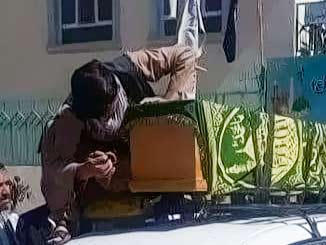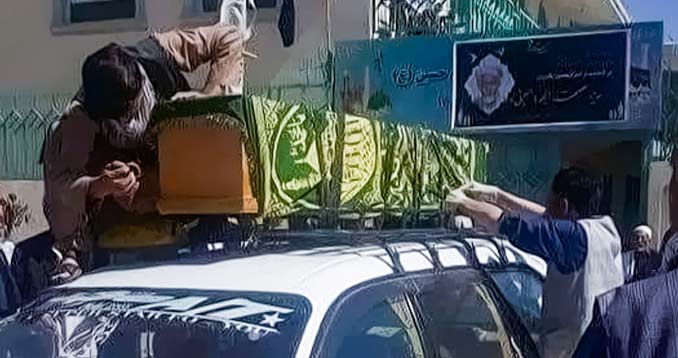

Hasht-E Subh Local sources in Ghazni province say that the bodies of 10 victims, innocently martyred in yesterday’s attack on the Kaj educational center in the west of Kabul have been taken to the Jaghori district of Ghazni province and burial purposes.
Sources on Saturday, October 1, say that the bodies of 10 students who died in the explosion were taken to the Jaghori district of this province and buried in separate ceremonies. More than 100 innocent students were killed and injured.
According to the sources, all these victims were girls under the age of 18 who were living in rented rooms in Kabul away from their families for taking preparation of university entrance examination away. The Taliban have announced that they will punish the perpetrators of this incident.
The deadly attack on the “Kaj” Educational Training Center (KEC), which left dozens dead and wounded, has drawn strong reactions from citizens, political figures, and international organizations. Amnesty International and Human Rights Watch have described the Taliban as an “absolute failure” in protecting minorities in the country. The spokesman of the Taliban, condemning the attack called it “a great horror”.
On Friday, September 30, Amnesty International, published a statement, that condemned the attack on the Kaj Educational Training Center in Dasht Barchi, the Hazara region of Kabul, and called it “the complete failure of the Taliban in protecting minorities”. In this statement, quoting Samira Hamidi, one of the organization’s officials in South Asia, it is said: “Today’s terrible attack is the latest in a series of attacks on mainly Hazara and Shiite areas, a shameful reminder of the absolute failure of the Taliban as the ruling authorities in protecting the people of Afghanistan.” The officials of this organization have accused the Taliban of neglecting the protection of religious minorities, especially the Hazara and Shiite citizens of Afghanistan. “Urgent measures must be taken to ensure the safety of all people under Taliban rule, especially members of minority communities,” the statement added.
Human Rights Watch also accuses the Taliban of failing to protect minorities. Fereshte Abbasi, a researcher of the Asia department of Human Rights Watch, shared the view of this organization in a conversation with Hasht-e Subh Daily. The officials of this organization talked about the attack on the Kaj Educational Training Center in Kabul: “This explosion once again shows how the Taliban fail to protect minorities in Afghanistan.”
On the other hand, Richard Bennett, the UN Special Rapporteur on human rights for Afghanistan, describes this attack as an “international crime” in a tweet and says: “The attack on the educational centers of the Hazara and Shiite people must stop. End the attack on Afghanistan’s future, stop the international crime.”
Besides this, the office of the United Nations Assistance Mission in Afghanistan (UNAMA) has also reacted to yesterday’s suicide attack. UNAMA wrote on its Twitter page: “During the deterioration of the security situation in Afghanistan, another explosion occurred in Kabul today. In this brutal attack on an educational center in a Hazara and Shia-majority region, civilians have suffered many casualties.”
Simultaneously with the reaction of international organizations, several political figures in the country have also condemned the deadly attack on Kaj Educational Training Center. Sibghatullah Ahmadi, the spokesman of the National Resistance Front tweeted: “The rule of the occupying Taliban and the free presence of other terrorist groups in Afghanistan; threatens the physical and psychological security of the people of Afghanistan, the region, and the world.”
Also, the Jamiat-e Islami Party of Afghanistan, led by Salahuddin Rabbani, has stated in a statement: “Today’s terrorist attack has once again shown that the Taliban group is unable to provide security for the people of Afghanistan and has serious management deficiencies and unbreakable links with other terrorist groups.”
Hamid Karzai, the former president of the country, in a statement, called the attack on the Kaj Educational Training Center “a crime against humanity and a conspiracy of the enemies of his homeland”. Abdullah Abdullah, the former head of the High Council for National Reconciliation, also condemned this attack and said: “I consider this brutality by the enemies of the peace and progress of my country.”
However, Mohammad Amin Ahmadi, a member of the peace negotiation committee of the previous government, wrote an article on his Facebook page under the title “The living flames of hatred and bigotry”. Mr. Ahmadi wrote: “Producing hatred against Hazaras and Shiites in Afghanistan, as stated in the report of the United Nations Special Rapporteur on Human Rights, is openly expressed in some mosques.” Ahmadi added that the Taliban have officially deprived the citizens of the Shiite religion of Afghanistan of their political, religious and cultural rights and marginalized them.
Meanwhile, several political figures and citizens of the country have called the Taliban responsible for promoting suicide attacks in the country. Shahrazad Akbar, the former head of the Afghanistan Independent Human Rights Commission (AIHRC), wrote on his Twitter page: “You were the initiator of the great horror when you called suicide attacks in markets, restaurants, and mosques Jihad, and made them public and holy.” Ms. Akbar added: “You taught children to kill, you shamelessly took pride in killing civilians such as journalists and judges. Your role in popularizing the culture of suicide cannot be forgotten or forgiven.”
Bahar Mehr, one of the users of social networks, wrote that the Hazaras are targeted with a clear plan, consciously. According to her: “Taliban, ISIS, Al-Qaeda and other Sunni terrorist groups prioritize the elimination of Hazaras as well as attacking Jewish, Christian and Hindu targets.” She added that the UN Security Council should take a practical step to protect the Hazaras and end this tragedy.
The citizens of the country, with their reactions in the media and cyberspace, also call the Taliban a failure in providing security and criticize the statements of the Taliban officials about “providing security throughout Afghanistan”, and called it a lie.
These reactions increased after the suicide attack happened inside a classroom of the “Kaj” Educational Training Center in the Hazara area of Dasht Barchi, which belongs to the 13th district of Kabul city. This incident happened around 06:30 on Friday morning, September 30th. Although the Taliban reported that 19 people died and 27 others were injured in this suicide attack, public sources report that at least 57 students have died. Lists circulating on social media show that most of the victims of this suicide attack are teenagers. UNAMA tweeted that 60 people were killed and injured in this incident.
It is said that after killing the guards of this educational center, the suicide bomber entered the classroom through the gate that was specified to the female students and detonated his explosive materials in the middle of the classroom. Therefore, most of the victims of this attack are girls. This suicide attack took place on Friday when the students gathered in this educational center at the weekend to participate in a demo examination to prepare for the national university entrance exam. The entrance exam is going to be held in Kabul soon.
After the control of the Taliban regime on the country, attacks on Hazara areas have increased. Human Rights Watch published a report on Tuesday, September 15th, saying that after the Taliban took control of Afghanistan, 13 suicide attacks took place on Shia areas, which are mainly Hazaras, and as a result, about 700 people were killed or injured.
Following these reactions, Taliban spokesman Zabihullah Mujahid called the attack on the Kaj Educational Training Center “a great horror” and condemned it. Mujahid wrote on his Twitter page: “Necessary measures will be taken to [arrest] and punish the perpetrators of this incident.”
According to the official management team of the Kaj Educational Training Center and relatives of the victims, the suicide bomber first fired at the security guards of this educational center and then blew himself up among the participants of the demo entrance exam. Seyed Nasim, the guard of Kaj Educational Training Center, is one of the first victims of this incident. One of his close relatives, Ruqiyeh Saei, told Hasht-e Subh Daily: “Today, the cries of Seyed Nasim’s mother, wife and children broke my heart.” Mrs. Sai adds: “Seyd Nasim, the guard of Kaj Educational Training Center, left behind five orphans. A bullet hit him in the head, and a bullet hit him in the heart, their house was in ruins.” She quoted Mrs. Seyed Nasim as saying: “When we got the news, we went to the hospital. My husband was hit by two bullets, one in his head, and one in his heart. The Taliban treated us very badly and forced us out. We were able to get his body after a long time of apologizing and lamenting to the Taliban.”
Navid Taimur, the brother of Shokrieh, a student who was injured in the attack on the Kaj Educational Training Center and is now in a coma, told Hasht-e Subh Daily: “In the morning, when I was going to the university, I saw on Facebook that a suicide bomber had committed suicide in Dashti Barchi area and it has happened in a Kaj Educational Training Center.., I got worried because my little sisters were studying there, so I hurried and came home. I didn’t say anything to anyone, I took the motorcycle and left. There were no students left when I went there [Kaj Educational Training Center]. I waited for too long, we were not allowed to enter there. I went to Watan hospital again. I rushed and saw the list of martyrs and wounded. I couldn’t find any. They bandaged the wounded and transferred them to other hospitals.” After many efforts, he was able to find his sister in the emergency hospital in Kabul, who is in a state of unconsciousness.
Zahir Moddaqeq, who lost his niece and his cousin’s daughter in this incident, wrote on his Facebook page: “Marzieh and Hajar, we grew up together, went to school together, and sat next to each other in the preparatory courses. Marzieh was my sister’s daughter and Hajar was my cousin’s daughter.” Mr. Moddaqeq also wrote: “Today they went to give a demo entrance exam, but they didn’t know that they don’t have a demo entrance exam today, today is a different program. They didn’t know that today is the plan to slaughter our Marziyahs and Hajars.”
Meanwhile, the survivors of the suicide attack on the Kaj Educational Training Center are complaining about the violent treatment of the Taliban and say that they were not allowed to enter the hospitals even to donate blood and see their wounded. The Taliban did not allow anyone to take pictures in the early hours of the explosion. It is also reported that the Taliban detained several journalists who were covering the incident for several hours.
This is the second time that this educational center has been attacked. Kaj Educational Training Center used to operate under the name of the Mauood Educational Training Center. This school was also attacked in 1397 [solar year equal to 2018/19] and dozens of its students were killed and injured. Several social media users shared the story of the victims of this incident and shared the soulless pictures of Sabira, another victim of this incident, whose body and her roommate, Madina, were transferred to the Jaghori district of Ghazni province. Social media users say: “Sabira came to Kabul from Jaghouri. She had rented a room together with Medina so that both of them could prepare for the entrance exam. Now they are taking the soulless bodies of Sabira and Medina to their hometowns.”
By launching the hashtag “#StopHazaraGenocide”, these users shared stories and separate narratives of the victims of this incident and asked the United Nations and human rights organizations to take fundamental measures to protect ethnic and religious minorities in Afghanistan.

Leave a Reply